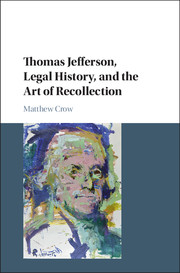(Source: CUP)
We did not report yet on this book by CUP on
Thomas Jefferson’s legal and political thought, published in 2017.
ABOUT THE BOOK
In this innovative book, historian Matthew Crow
unpacks the legal and political thought of Thomas Jefferson as a tool for
thinking about constitutional transformation, settler colonialism, and race and
civic identity in the era of the American Revolution. Thomas Jefferson's
practices of reading, writing, and collecting legal history grew out of broader
histories of early modern empire and political thought. As a result of the
peculiar ways in which he theorized and experienced the imperial crisis and
revolutionary constitutionalism, Jefferson came to understand a republican
constitution as requiring a textual, material culture of law shared by citizens
with the cultivated capacity to participate in such a culture. At the center of
the story in Thomas Jefferson, Legal History, and the Art of Recollection, Crow
concludes, we find legal history as a mode of organizing and governing collective
memory, and as a way of instituting a particular form of legal subjectivity.
·
Sheds
new light on Jefferson's thinking through original archival research and
situates Jefferson's intellectual practice in a variety of contexts such as
legal history and colonialism
·
Focuses
on a single figure while showing the historical and theoretical relationships
between legal, political, and historical thought in the early modern Atlantic
world and the founding of the United States
·
Expands
our understanding of the history and politics of historical thought by putting
Jefferson's use of history in dialogue with the present
ABOUT THE AUTHOR
Matthew Crow, Hobart and William Smith Colleges, New York
Matthew Crow is an Assistant Professor of History at Hobart and William Smith Colleges in Geneva, New York.
Matthew Crow is an Assistant Professor of History at Hobart and William Smith Colleges in Geneva, New York.
TABLE OF CONTENTS
1. Introduction: 'in the course of human
events…'
2. Jurisdiction and British legal memory in
colonial Virginia
3. New-modeling and rewriting in revolutionary
Virginia
4. Labor, language, and the legal subject of
the Notes on the State of Virginia
5. Governing the usufruct of the living
6. The discipline of recollection. Conclusion.


No comments:
Post a Comment